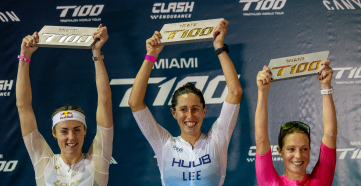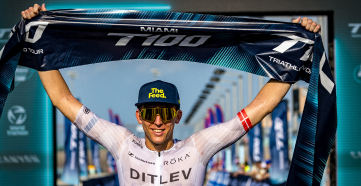Just lining up for the PTO 2020 Championship is something of an achievement for Paula Findlay, as five short years ago she wasn’t even sure she wanted to continue her triathlon journey.
The Canadian star, currently #19 in the PTO World Rankings, had been beaten down by a mix of injury and failing to live up to the expectations of her early career as a short-course prodigy.
Appearing in the PTO’s ‘Unbreakable’ documentary series, which shines a light on the lives of elite stars ahead of the big showdown at CHALLENGEDAYTONA®, she was brutally honest about the thoughts whirling around her mind.
“Five years ago I think I was a bit confused about whether I still wanted to do triathlon.
“I was probably injured, I was trying to decide between career paths, if I wanted to like go back to school or continue in the sport. I’d sort of been through a lot.”
The pain of London 2012
Paula, now 31, had shown spectacular promise in her early days, and went to the London 2012 Olympics as a live medal chance. It was a day though that for years after would define her, for the wrong reasons.
Instead of battling for a spot on the podium she finished 52nd, and last. Shortly after, Paula was diagnosed with iron-deficiency anemia. While it did provide some reason for that awful day, the pain of London is something she still remembers.
“After the London Olympics, it was a very long time ago so I don’t fully remember the emotions, but I just know it was very, almost embarrassing and heartbreaking because of all the expectations I had and attention I had going into the race as a medal hopeful.
“So, having a bad race is never fun but having it on that stage is even worse. I did end up finishing the race, although it was not a good result. I don’t regret finishing.”
Paula, who had also battled a hip injury in the countdown to London, would go through many changes and emotions in the ensuing years. But through it all, she epitomised the true spirit of competition. She refused to quit.
“I think publicly I’m a bit of a question mark all the time because I did have a lot of success when I was younger, and then I kind of disappeared for a long time.
“And although I didn’t ever quit the sport, I was kind of injured, having not great results, my body changed a lot.
“I was just kind of like, turning into an adult and it was like a rough eight years or so of transition.”

Curious Paula targets top five
As she prepares to line up alongside more than 100 elite triathletes in Florida next month – the strongest field ever assembled by the sport – Paula is almost curious about what lies in store for her. She will take heart from the fact she emerged victorious at Daytona last year.
“Obviously I do have a lot of potential based on my results from 2010, 2011, but that’s a really long time ago so I think I’ve also been written off in a lot of people’s minds – even in my own mind sometimes.
“I do feel like this year off of racing has helped me get healthy and be actually fitter than I have in a long time so I am excited for the opportunity to race in Daytona.
“Just because I feel better than I have in the last five years and I’ve had a more consistent year of running than I’ve ever had.
“I am pretty open about the ups and downs that come along with the sport and in the past I wasn’t as good at that.
“Like leading into the London Olympics I was quite injured and unhealthy, and I kind of kept it to myself and pretended everything was fine.
“But I’ve got a lot better at kind of sharing my story and I think that’s why people have continued to follow me, and follow Eric (Lagerstrom, Paula’s partner) and I – we are very honest about the struggles that we face, and also the highs that we go through.
“I think definitely I’m not unbreakable, in fact I’m fairly breakable in terms of my body. But a lot of it does come down to the mind and who’s the strongest in their head, on the day.
“Because everyone’s fit, everyone’s trained hard, everyone’s an amazing athlete. But who has the mental capacity to deal with little setbacks in the race and push through pain to be able to win? That’s what I think is the biggest part of it.
“I’m curious I guess, more than anything, to see how I’ll do in Daytona. To do well there would mean a lot in terms of just making a mark on the big race of 2020.
“And I could see myself coming top five – I think that would be a really, really good race for me. And it’s kind of scary to say that because honestly I have no idea.”

Health equals wealth for Findlay
Whatever happens at the iconic motorsport venue, just going into a race 100% healthy is something Paula is relishing.
“It is pretty cool to go into a race with full run fitness and having a full year running behind me, without any interruptions or injuries, so that gives me a lot of confidence.
“I definitely want to take over and I had that mindset at the Olympics – I didn’t want to just go participate, I wanted to go win.
“And I feel like that about Daytona – I don’t want to just go race, I want to go finish on the podium, and win ultimately if that’s possible.”
Often the people best qualified to talk about star athletes are the people who know them best. Eric has seen Paula’s struggles close up, and has the ultimate respect for how she has come through them.
“I almost look at it like two phases. She has this Olympic phase where she just rocketed to the top of the world and had everything you could possibly want in the sport.
“And then to have it all taken away and kind of have to build back up, is in my mind infinitely more challenging than to have never had that extreme high.
“A lot of the times I’m just like really, very impressed that Paula is still in the sport.
“I think there’s plenty, plenty of times and plenty of years that any other person would have left. I think deep down somewhere she has unfinished business.”

















